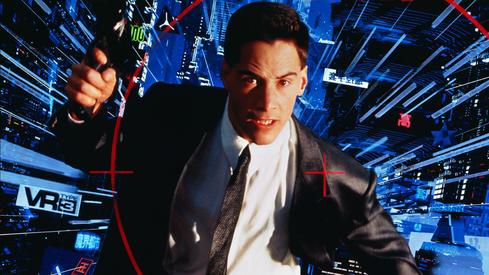From a PowerBook that defeats alien spaceships to cyber terrorists who take over the US with a few keystrokes, Hollywood makes ridiculous tech gaffes. Which is the worst?

spend decades coming up with a UI that actually makes all the information coherent and usable. "Now, there's a dashboard I'd like to see," then-Computerworld editor Angela Gunn quipped when the film came out. Indeed, more than seven years later, lots of companies talk about tools that converge several management consoles onto a "single pane of glass," but the sort of all-powerful system seen in Die Hard remains a fiction.
10. Johnny Mnemonic
We might one day be able to upgrade our brains and store data in our enhanced cerebellums, just as we do today with our PCs. Whenever this tech arrives, though, I doubt we'll be limited to 160 GB of mental storage, or that upgrading your brain capacity to 320 GB will have life-threatening consequences. Also, if our society devolves over the next few years into some kind of cyber dystopia, I doubt people will be using things like VCRs and fax machines.

Go easy on me, guys. I made The Matrix four years later. (Source: Blastr)
The plot of Johnny Mnemonic, which is set sometime this century, relies on all of the aforementioned concepts. Granted, the movie came out back in 1995, when many computer drives weren't measured in terabytes or even gigabytes, but in megabytes. This makes it a little easier to forgive some of the film's more anachronistic ideas, but given that the screenplay is based on a story by cyberpunk icon William Gibson, the tech in Johnny Mnemonic should have been better conceived. As the late film critic Roger Ebert put it, it's "puzzling that this movie is so dumb about computers."
Bonus: NCIS and CSI
NCIS is a TV show, not a movie. Even so, it and similar programs, such as CSI, feature enough tech stupidity to fill several big screens. Imagine if the dumbest clichés from Live Free or Die Hard had a baby with the most idiotic tropes from Enemy of the State. Now imagine if this baby were dropped on its head every day of its childhood, and if it accrued its tech knowledge by watching Michael Bay and James Bond movies. That's basically NCIS.
The show provides such a cornucopia of preposterousness, I thought it would be impossible to find a single clip that encapsulates the show's enthusiastic disregard for computing reality. Amazingly, though, NCIS delivered.
What's the best way to ward off a rapidly developing hacker intrusion? In most movies, the solution is clearly to type faster. Not to be outdone, the NCIS writers evidently decided that two people typing faster would communicate twice the urgency. And to really drive home just how dire the situation is, they decided to have both characters type on the same keyboard. Unless the two characters happen to share a brain, I'm not sure how their strategy is supposed to help.
If the world weren't changing, we might continue to view IT purely as a service organization, and ITSM might be the most important focus for IT leaders. But it's not, it isn't, and it won't be -- at least not in its present form. Get the Research: Beyond IT Service Management report today (free registration required).
About the Author(s)
You May Also Like







